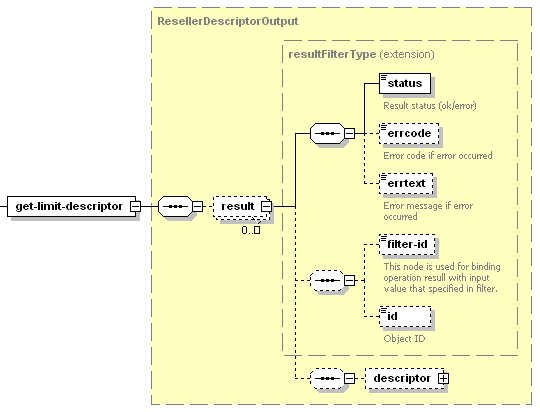Retrieving Descriptor of Limits
The get-limit-descriptor operation is used to retrieve descriptor of a reseller’s limits. For details on the limits descriptors, refer to the Representation of Object Descriptors section. For details on reseller’s limits, refer to the Limits section.
Request Packet Structure
A request XML packet retrieving reseller limits descriptor includes the get-limit-descriptor operation node:
<packet>
<reseller>
<get-limit-descriptor>
...
</get-limit-descriptor>
</reseller>
</packet>
The get-limit-descriptor node has the following graphical representation:

Note: The interactive schema navigator for all request packets is available here: http://plesk.github.io/api-schemas/1.6.9.1/agent_input.svg.
- The filter node is required. It specifies reseller accounts whose limit descriptors are to be retrieved. Data type: ResellerSelectionFilter. To view the structure of this node, refer to the Available Filters section.
Response Packet Structure
A response get-limit-descriptor node is structured as follows:

Note: The interactive schema navigator for all response packets is available here: http://plesk.github.io/api-schemas/1.6.9.1/agent_output.svg.
-
The result node is required. It wraps the response retrieved from the server. Data type: ResultFilterType (
common.xsd).-
The status node is required. It specifies the execution status of the get-limit-descriptor operation. Data type: result_status (
common.xsd). Allowed values:ok|error. -
The errcode node is required if the get-limit-descriptor operation fails. It returns the error code. Data type: unsignedInt.
-
The errtext node is required if the get-limit-descriptor operation fails. It returns the error message. Data type: string.
-
The filter-id node is required if the get-limit-descriptor operation succeeds. It returns parameter by which reseller account was filtered in the request packet. Data type: anySimple.
-
The id node is required if the operation succeeds, or if the results are filtered by ID. It returns ID of the reseller account which limits descriptor was displayed. Data type: id_type (
common.xsd). -
The descriptor node is required if the get-limit-descriptor operation succeeds. It specifies object descriptor. For details, refer to the Representation of Object Descriptors section. Data type: string.
Note: This descriptor contains limits extensions. For details, refer to the Representation of Object Descriptors: Property Descriptor > Extension of Limits Descriptor section.
-
Samples
The following packet retrieves limits descriptor for a reseller account:
<packet>
<reseller>
<get-limit-descriptor>
<filter>
<login>JDoe</login>
</filter>
</get-limit-descriptor>
</reseller>
</packet>
Response:
<packet>
<reseller>
<get-limit-descriptor>
<result>
<status>ok</status>
<filter-id>180</filter-id>
<id>180</id>
<descriptor>
<property>
<name>max_dom</name>
<type>int</type>
<writable-by>admin</writable-by>
<label>limit__max_dom</label>
<extension>
<shared>false</shared>
</extension>
</property>
<property>
...
</property>
</descriptor>
</result>
</get-limit-descriptor>
</reseller>
</packet>
Note: Data structures that describe a number of properties are omitted to improve the readability of the sample.